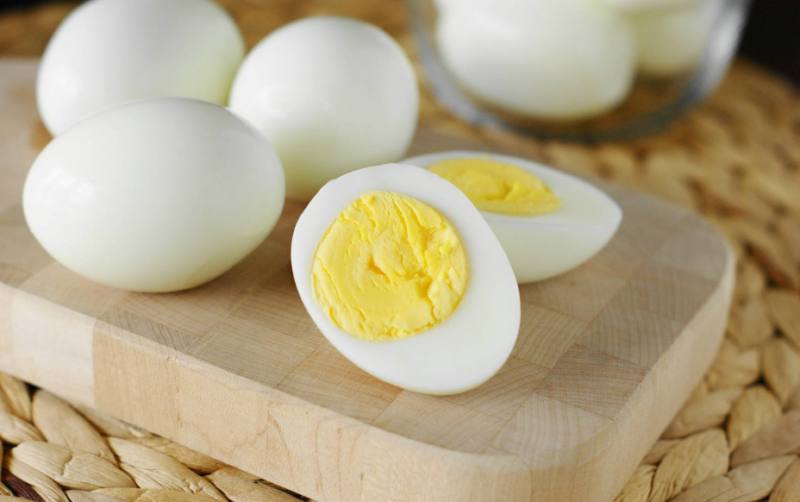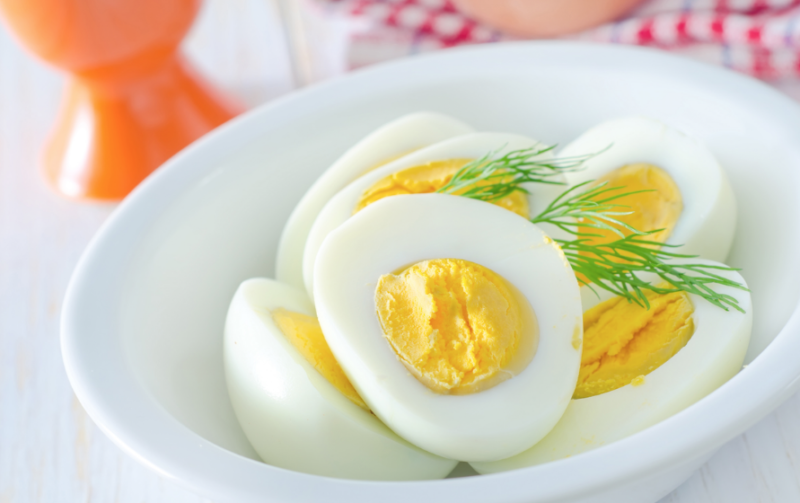Chicken eggs are one of the well-known and common foods that most people eat daily. They are often used in various power systems for weight loss. Therefore, you need to know how many calories in a boiled egg in order to make the right diet.
Material Content:
Chemical composition and nutritional value
The egg contains the following vitamins:
- A, E, D, H, K, PP;
- B1, B2, B4, B5, B6, B9, B12.
What else do you have:
- Trace elements - iodine, chromium, iron, cobalt, molybdenum, manganese, copper, selenium, zinc, fluorine.
- Macronutrients - calcium, sodium, potassium, magnesium, chlorine, sulfur, phosphorus.
- The rest is water, ash, saturated fatty acids, polyunsaturated (omega-3 and omega-6) fatty acids, cholesterol.
Chicken eggs contain quite useful and irreplaceable substances. If you use an adequate amount of the product, they will only benefit.
Calorie content and boju boiled eggs
A table of the ratio of proteins, fats and carbohydrates; how many calories in a hard boiled egg per 100 g:
| Name | how many |
|---|---|
| the energy value | 158.7 calories |
| carbohydrates | 0.7 g |
| fats | 11.6 g |
| squirrels | 12.9 g |
An average-sized egg weighs 50-60 g. Accordingly, indicators per unit will be less than almost half.
The calorie content of a raw egg is 157 kcal per 100 g. A soft-boiled egg contains the same calories as a cool egg - 158.7.
Interesting: there are more proteins in the yolk than in the protein itself.
Daily intake
A day should not eat more than 3 - 4 pieces. Normally, 1 to 2 eggs are sufficient. Children under 7 years old are not recommended for more than 10 - 15 pieces per week, but better than 1 piece per day.
Athletes should also not consume too much of this product. For the normal functioning of the body requires a diverse protein.In addition to eggs - from meat or fish, as well as vegetable.
For weight loss, you should not use more than one or two per day, because in one average egg 75 - 80 kcal.
Important: you can not eat a lot of yolks, but protein is allowed in large quantities. For example, you can eat one whole egg and three proteins per day.
Nutritionists believe that eating an excessive amount of eggs prevents the body from replenishing all the necessary substances. Yes, there is a lot of good in eggs. But at the same time, do not neglect other products, the diet should be as diverse as possible.
Application for various diseases:
- soft-boiled eggs are allowed for dysbiosis, cystitis (up to two per week);
- with pancreatitis during remission - no more than 1 per day, up to four per week;
- gastritis allows daily eating of one soft-boiled egg, the same can be said about a stomach ulcer;
- if there are problems with the liver, colitis, intestinal infection, rotavirus, diarrhea - up to two per day;
- with diabetes - only soft-boiled, not more than two per day, it is advisable to consult a doctor;
- three days after the removal of appendicitis - one soft-boiled.
How to teach a baby to eat eggs? Starting from 9 to 12 months, you can proceed with this.
- First, grind a very small piece of yolk and give a try.
- Two days later, if no allergy has manifested, give again.
- After that, give three times a week or less.
- Protein is taught according to the same principle, but after a year.
- After that, you can give a whole egg, but not more than three times a week.
Children under one year old are not recommended to use them in their entirety at all.
Product Benefits
Eating chicken eggs is only beneficial.
What good will the body get from this food:
- Strengthening bones, nails and teeth, preventing the development of certain bone diseases. The appearance of the skin becomes nicer.
- Normalization of the cardiovascular system. Blood composition and its functioning are improving.
- Regulation of the concentration of cholesterol in the blood. With constant use, the liver gets used and begins to produce less cholesterol. With the right amount of product, “good” cholesterol rises, and “bad” cholesterol decreases.
- Help hormonal, immune, reproductive systems. Improving the functioning of the brain and the entire nervous system.
- They cleanse the body of harmful and toxic substances.
Egg white is absorbed by 98%. Therefore, it has high nutritional value.
Often include eggs in diets to reduce body weight.
Contraindications
Do not eat raw eggs, so as not to get infected with salmonellosis. To destroy the carrier of the disease, you should carefully cook them.
When you should not use the product at all:
- with allergies to it;
- children under 9 months old - yolk, up to a year old - protein;
- with kidney stones;
- at the time of exacerbation of cardiological diseases;
- with hypothyroidism;
- with constipation - hard-boiled eggs, because they fix, and soft-boiled will be useful;
- with diseases that limit the number of eggs, the method of preparation is also limited - basically you can only soft-boiled, but not hard-boiled.
In diabetics, eating eggs frequently increases the risk of stroke or heart attack.
Chicken eggs are a source of various beneficial elements. They should be included in any diet if there is no allergy and contraindications.















